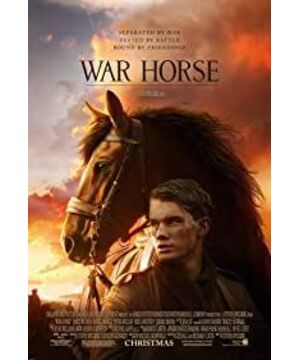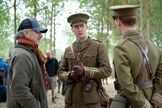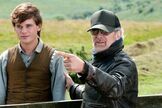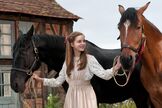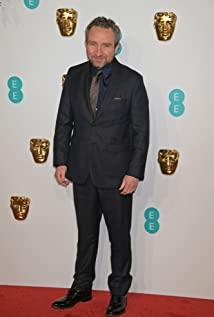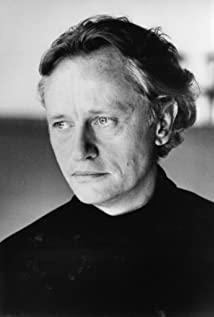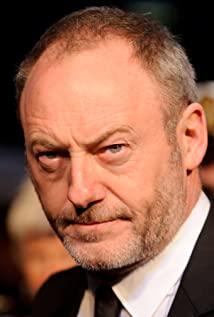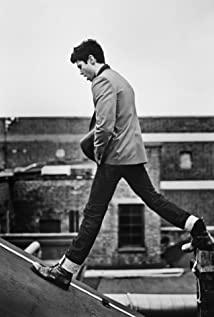The same is true of War Horse, the light and ugly confrontation in the First World War caused by man's worldly desires from the point of view of the horse. These movies often make the audience think deeply. These truths are very simple, even animals understand, why people who are human don't understand! An extreme wording is the Chinese saying "even beasts are inferior". The context used by this saying does not need to be repeated. It is basically related to people's physiological desires, and people are also full of strong desires in terms of money and power. Therefore, this common saying also seems to be in line with the context of this article.
The most impressive scene in the movie is the one where the British and German troops join forces to help Joey after Joey is trapped by the wire. Joey was trapped officially after the German army was forced to retreat. The British army was confronting the German army at this time, just across the no-man's land where the artillery of both armies was bombarding, and Joey was trapped in this no-man's land. The next morning, before the attack, British soldier Colin saw an abnormal animal in the no-man's land, and then other comrades also saw it. Some said it was a horse, some said it was a cow. When they determined that it was a horse, they immediately came up with the idea of rescuing it.
Then, Colin first raised the white flag to the German army to show his surrender. Colin shouted to the enemy that he wanted to save the horse first and not shoot at him. He went to the no-man's land very anxiously. What he said in his mouth, Derived from the 23rd Psalm in the Bible, a very famous poem: "The LORD is my shepherd, and I shall not want. "People" is called "people", just as "he" is the third person of people. In Chinese, the word "show" represents "shen", see "Shuowen Jiezi") to make me lie down on the green grass, and lead me to rest in peace The water's edge." Director Spielberg is Jewish, so this is a text he is very familiar with, and it is also very familiar and even catchy in the Western world. Colin seems to be over with just these few sentences, but the sentence in the original text that follows this sentence must be the eyes of the movie! The words that followed were "He revives my soul and guides me in the paths of righteousness for his name's sake"! The literal understanding is: God awakens people's conscience and is guided by God to take the path of justice and justice. War is not out of human conscience, but precisely because of human greed. When we heard Colin read this passage, it seemed that the end of the story had been hinted to us by the director!
When Colin arrives at the horse with an uneasy heart, lamenting that he forgot to bring the wire cutters, another person appears in the shot! Yes, it was German soldier Peter, who brought wire cutters, and there was no hostility. Then, the two discussed how to rescue the horse. When Peter shouted to his comrades, "We need more string cutters." Five or six wire cutters flew out of the trench and landed in the puddle next to him. What a humorous and heartwarming comedy scene, it's hard to imagine appearing in a brutal war movie, giving the audience hope that "the war is coming to an end"!
The next scene was even more vivid. The two asked each other for warmth and understood each other's situation. Colin said more bluntly, "My marksmanship is very bad, don't hit me in the fight later!" On the ownership of the final horse, Peter suggested that the two should fight and whoever wins the horse should go to the other. The way to flip a coin is decided. This should be the strongest ridicule of the two sides using war to solve the problem! That coin seems to say that it is enough to decide the outcome of the game with just one coin. Then, they signed each other's names, Peter gave Colin a German-made wire cutter as a souvenir, and finally the two said goodbye to each other as brothers.
The "brotherhood" here seems to be yet another hint. The book of Genesis in the Bible records that the first murder after the fall of mankind occurred between a pair of brothers, elder brother Cain and younger brother Abel. When it came time to sacrifice to God every year, God valued the sheep and fat offered by Abel, who had a heart of reverence, but did not value the produce of the field offered by Cain, who did not take God seriously. Out of jealousy, Brother Cain killed his brother Abel in a fit of anger. This is also a story that director Spielberg knows so well. Jealousy between brothers can lead to killing, and human brothers, regardless of race and national borders, can shake hands and make peace regardless of interests!
In addition, there is another problem that needs to be solved: people may think that it is unreasonable for everyone to save a horse. In fact, if you understand the era background of World War I, you will find that such a bridge is quite reasonable. According to relevant information, as many as one million horses were thrown into the battlefield with the British army in World War I, but only 60,000 horses survived by the end of the war. For that era, horses were not only a means of transportation, but also a farming tool. No matter which side's horse is, the other side will usually take it for himself and will not treat it rudely, just like the breeders on both sides of the war that Joey encountered were very friendly to horses.
Another concept that the director may want to express in the movie is probably: God only gives people the authority to manage the birds in the sky, the beasts on the ground, and the fish in the sea, and does not tell people that they have the right to dominate their life and death. The above data, let us see: in the war, the horse as the object of human management, its sacrifice is huge. The management of animals by humans is to assign work tasks to horses, and horses can be used to accomplish some things. Horses should be treated kindly, rather than letting horses pay for human desires!
The stark contrast to the British military doctor in the film may also have implications. When Colin held the scarred Joey, hoping the doctor would heal. The military doctor thinks that Joey has tetanus, just a horse. He still has many people to save, and he has no time to heal a horse that has been solved. He thinks that Joey should be shot to death. Maybe it will make Joey no longer pain. Later, when he learned that it was raised by Albert and was originally a warhorse of the British army, he decided to treat it again. The change of the military doctor was very fast, and the audience immediately filled him with all kinds of contempt. Isn't this military doctor a portrait of ourselves? Because it is the British army's own horse to go to the treatment, the German army's horse can be killed to avoid wasting the medicine? What if that horse wasn't a remarkable ("impressive", the adjective used to describe Joey in the movie)? What if it was a dying enemy who was missed by the enemy on the battlefield and found by our army, would you still save it?
It may be difficult for us to answer this question! However, animals have set a good example for us. Animals do not distinguish between enemy troops and friendly countries. Joey helped both the British and the Germans as he traveled back and forth between the Anglo-German battlefields. What about people? Is there no such person? Of course there is! Dawes in "Blood Battle Hacksaw Ridge" is one of them, and it's not fiction, it really exists! He not only rescued the Americans, we learned from his comrades that he also rescued several dying Japanese soldiers. It's not that Dawes was busy saving people and didn't sleep all night, he was too busy to save the Japanese as his comrades in arms, but what he had in his heart was a kind of fraternity that did not distinguish between the enemy and the enemy, it was a kind of unrewarded and unconditional love. Big Love. Therefore, we should abandon the narrow concept of "one acre and one-third of the land" and "everyone sweeps the snow in front of his own door, and doesn't care about the frost on other people's tiles", so that you and I can experience the share between people. Love exists!
View more about War Horse reviews


